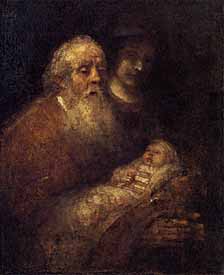
|
Old Testament
New Testament
Gospels
Acts
Paul's Letters
General Letters
Revelation
Topical Studies
Beginning the Journey (for new Christians). en Español

|
Old Testament
New Testament
Gospels
Acts
Paul's Letters
General Letters
Revelation
Topical Studies

|
Home
Bible Studies
Articles
Books
Podcasts
Search
Menu
Donate
About Us
Contact Us
FAQ
Sitemap
Day 20. The Blessing of Simeon (Luke 2:25-35)
Friday, Third Week of Advent
Read in your Bible: Luke 2:25-35
 Rembrandt, 'Simeon's Song of Praise' (1669), oil on canvas, 99 x 80 cm, National Museum, Stockholm. |
Jesus is born into a very Jewish family that keeps all the Jewish laws blamelessly. In today's reading we glimpse three Jewish ceremonies:
- Circumcision, performed on the eighth day for all male children (verse 21),
- Purification from childbirth for Mary, 40 days after her son's birth (verses 22a, 24), and
- Consecration of the firstborn, in recognition that the firstborn son belongs to the Lord (verse 23).
Circumcision, of course, is a rite of being included in the Covenant, normally performed perhaps by the village rabbi or elder. On this occasion his name is announced -- Jesus (Hebrew Yeshua), which means "salvation" (Luke 2:21). We discussed this on Day 8.
It was the Jewish custom to offer a sacrifice to purify the woman after childbirth from ceremonial uncleanness and offer a sacrifice in the temple (Leviticus 12:2-6, 8; Luke 2:22, 24). On this day the family also appears with Jesus for a ceremony of consecration of the firstborn (Luke 2:22b-23).142 Today, however, I want to focus on the Holy Family's encounter with Simeon.
Pious Simeon (Luke 2:25)
Simeon just "happens" to be in the temple at the time the Holy Family are there.
"Now there was a man in Jerusalem called Simeon,143 who was righteous and devout ... and the Holy Spirit was upon him." (Luke 2:25)
We learn several things about Simeon:
- Simeon is old, he is waiting for a promise to be fulfilled before he can die.
- Simeon is "righteous" (NIV) or "just" (KJV),144 an upright man.
- Simeon is "devout,"145 God-fearing, loving God.
- The Holy Spirit rests upon Simeon. Just as we read in the Old Testament that the Holy Spirit sometimes comes upon prophets and others to accomplish particular tasks for the Lord,146 the Spirit rests upon Simeon for a very specific, prophetic purpose this day.
Waiting for the Holy Spirit's Promise (Luke 2:25-26)
Simeon has been anticipating this day in the temple for some time.
"He was waiting for the consolation of Israel, and the Holy Spirit was upon him. It had been revealed to him by the Holy Spirit that he would not die before he had seen the Lord's Christ." (Luke 2:25-26)
He is "waiting for," eagerly expecting,147 the "consolation148 of Israel," that is, the promised relief brought by the Messiah. In fact, God has promised149 him that he won't die until he sees the Messiah.
Simeon Meets the Holy Family in the Temple Courts (Luke 2:27-28)
Today is the day. The Holy Spirit nudges Simeon, and Simeon is attuned to the voice of the Spirit.
"Moved150 by the Spirit, he went into the temple courts. When the parents brought in the child Jesus to do for him what the custom of the Law required, Simeon took him in his arms and praised151 God, saying...." (Luke 2:27-28)
If you've ever just witnessed an answer to prayer, then you know something of the joy that Simeon feels welling up within him as he prays a prayer of thanksgiving.
Simeon's Prophetic Praise (Luke 2:29-33)
"'Sovereign Lord, as you have promised,
you now dismiss your servant in peace.
For my eyes have seen your salvation,152
which you have prepared in the sight of all people,
a light for revelation to the Gentiles
and for glory to your people Israel.'
The child's father and mother marveled at what was said about him." (Luke 2:28-33)
Simeon's prophetic hymn is called in liturgical churches the Nunc Dimittis, after the first two words of the prophecy in Latin, and often sung as one of the "canticles" or songs of the New Testament as part of Roman Catholic piety.
Simeon sees that this Child is to be the Light, not just for the Jews, but also for the Gentiles. For Mary and Joseph this confirms the angel's message on Christmas night:
"I bring you good news of great joy that will be for all the people" (Luke 2:10).
In Isaiah 49:6 we read:
"I will also make you a light for the
Gentiles,
that you may bring my salvation to the ends of the earth."
Simeon's Prophecy to Mary (Luke 2:34-35)
Now Simeon turns to Mary.
"This child is destined to cause the falling and rising of many in Israel, and to be a sign that will be spoken against, so that the thoughts of many hearts will be revealed. And a sword will pierce your own soul too." (Luke 2:34-35)
 Also available in book formats: PDF, Kindle, and paperback. |
His prophecy has four elements:
- "This child is destined to cause the falling and rising of many in Israel." How people respond to Jesus and his message will determine their destiny. Jesus becomes "a stone that causes men to stumble and a rock that makes them fall."153
- "and to be a sign that will be spoken against."154 Jesus is God's sign to his people, but he is rejected.
- "so that the thoughts155 of many hearts will be revealed."156 Those who stumble at Jesus, who reject him and oppose his message, will finally be shown up for what they are.157
- "And a sword will pierce your own soul too." Through the Holy Spirit, Simeon can see the deep anguish that Mary will feel as her son is rejected by the nation's leaders and ultimately crucified.
Prayer
Father, I am in awe of the old man Simeon who loves you and has been waiting for years to see the Christ Child. Let me have his patience, his sensitivity to your voice, his joy at the fulfillment of your promise, and his discernment of your words. In Jesus' name, I pray. Amen.
Discussion Question
Q20. (Luke 2:25-35) Why does God send Simeon to the
temple on this day? Why do you think this incident is recorded in Luke's
Gospel? How was Simeon's prophecy over the Child fulfilled?
https://www.joyfulheart.com/forums/topic/2094-q20-simeon/
Endnotes
[142] Exodus 13:1; Numbers 3:11-13. For more background on these ceremonies see my exposition of Luke 2:21-38. https://www.jesuswalk.com/luke/apx1g-simeon-anna.htm
[143] Simeōn is a Hebrew name, for which the similar-sounding genuine Greek name Simōn is sometimes substituted (Symeōn, BDAG 957). The name means "hearing" in Hebrew.
[144] This is a common Greek noun dikaios, which means, "pertaining to being in accordance with high standards of rectitude, upright, just, fair" (BDAG 246-247).
[145] "Devout" translates the Greek noun eulabēs, "devout, God-fearing, pious, reverent" (BDAG 407; Louw and Nida, NT Greek-English Lexicon, q.v.; Barclay Newman, NT Greek-English Dictionary, q.v.).
[146] Numbers 24:2; Judges 3:10; 6:34; 11:29; 14:6, 19; 15:14; 1 Samuel 10:6, 10; 11:6; 16:13; 19:20, 23; 1 Chronicles. 12:18; 2 Chronicles 15:1; 20:14; 24:20; Ezekiel 11:5; Luke 1:35; Acts 8:16.
[147] "Waiting" is the Greek verb prosdechomai, which has two senses, (1) "to receive favorably, welcome," and "to look forward to, wait for" (BDAG 877). It comes from the root word parakaleō, "call to one's side" then "help, encourage, comfort." In our passage Simeon is eagerly looking forward to the time when occupied, weary Jerusalem receives her comfort and relief from the Lord, which was popularly expected to be brought about by the Messiah.
[148] "Consolation" is the Greek noun paraklēsis, "lifting of another's spirits, comfort, consolation" (BDAG 766, 3).
[149] "Revealed," the Greek verb chrēmatizo, "impart a divine message, make known a divine injunction or warning" (BDAG 1089).
[150] "Moved by" (NIV) or "came by the Spirit" (KJV) translates the common verb erchomai, "come," but the cause of his coming is the Spirit.
[151] "Praised" (NIV) or "blessed" (KJV) in verse 28 is the Greek verb eulogeō. When directed toward God we translate it "to say something commendatory, speak well of, praise, extol." It appears in verse 34 as "to bless" (BDAG 407-408).
[152] The child Jesus is equated with "your salvation" in verse 30. It is not accidental that Jesus' name, in Hebrew Yeshua (a form of the name "Joshua"), means literally, "salvation." So Simeon looks on the child named "Salvation" and says, "my eyes have seen your salvation...."
[153] Isaiah 8:14; 28:16; Luke 20:17-18; Romans 9:33; 1 Peter 2:6-8.
[154] "Spoken against" is the Greek verb antilegō, "speak against, contradict someone, oppose, refuse" (BDAG 89).
[155] "Thoughts" is the Greek verb dialogismos, "content of reasoning or conclusion reached through use of reason, thought, opinion, reasoning, design" (BDAG 232-233). Here it seems to be used in a negative sense.
[156] "Revealed" is the Greek verb apokolyptō (from which we get our English word "apocalypse"). It means, "to cause something to be fully known, reveal, disclose, bring to light, make fully known" (appearing here and at Matthew 10:26 with a judicial connotation (BDAG 112. Albrecht Oepke, apokalyptō, TDNT 3:590).
[157] Romans 2:16; cf. Acts 17:31; 2 Corinthians 5:10.
Copyright © 2025, Ralph F. Wilson. <pastor![]() joyfulheart.com> All rights reserved. A single copy of this article is free. Do not put this on a website. See legal, copyright, and reprint information.
joyfulheart.com> All rights reserved. A single copy of this article is free. Do not put this on a website. See legal, copyright, and reprint information.

